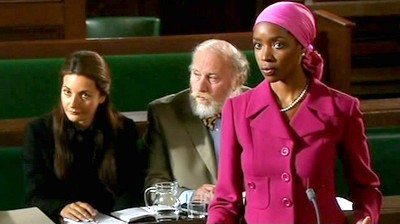| Reviews & Columns |
|
Reviews DVD TV on DVD Blu-ray 4K UHD International DVDs In Theaters Reviews by Studio Video Games Features Collector Series DVDs Easter Egg Database Interviews DVD Talk Radio Feature Articles Columns Anime Talk DVD Savant Horror DVDs The M.O.D. Squad Art House HD Talk Silent DVD
|
DVD Talk Forum |
|
|
| Resources |
|
DVD Price Search Customer Service #'s RCE Info Links |
|
Columns
|
|
|
Judge John Deed - Season Five [Censored!]
Further, to that end the BBC and 2|entertain's packaging is unconscionably deceptive. I leisurely worked my way through to what I thought was the last episode of season five, only to discover, just as the season-long story arc and its various threads had worked themselves into a fever pitch, everything abruptly screeched to a halt. Everything that had been building up in episodes 1-4 was left utterly unresolved. "This can't be right!" I thought to myself. Sure enough, I soon discovered, the last two episodes of Season 5 were not included on this set. Deliberately.
Why, I wondered? Could it be because Judge John Deed's six and final season runs just four hours (due to a change in format) and perhaps they're planning on sticking the last two episodes from Season Five onto that, to beef it up a little? Nope. The same two episodes are missing from the British DVD of Judge John Deed's Series Five nor are they included on the Series Six set, either. For a show frequently about government officials trying to suppress Judge John Deed, the irony that the BBC has done for real the very same thing to Judge John Deed.
The packing of the U.S. set is shamefully deceptive. Nowhere on the box is there any mention that the last two episodes have been deliberately excluded, let alone offer any sort of explanation for this. The cover art reads "Season Five" and, below that, in much smaller type, "Episodes 1-4." Unless the consumer knows in advance that six, not four, episodes originally aired six years ago, they'd naturally assume they were getting a complete set.
Admittedly, Judge John Deed - The Incomplete Season Five or Judge Judge Deed - Season Five Excepting the Climax might adversely affect sales, but at least it'd be honest. One can't help be reminded of Monty Python's classic "Crunchy Frog" sketch: "I hardly think that's good enough! I think it'd be more appropriate if the box bore a great red label: 'WARNING: LARK'S VOMIT!!!"
More on the mystery surrounding those MIA shows below. Suffice to say, however, that the experience of watching the first six hours of a larger story only to discover the last three are deliberately being withheld is frustrating beyond words. Imagine Casablanca grinding to a halt just as Ilsa Lund pulls a gun on Rick Blaine, or The Wizard of Oz stopping suddenly just as the Wicked Witch of the West was setting the Scarecrow on fire.
For that reason I cannot endorse such an appalling two-thirds release.
One of the scenes the BBC doesn't want you to see
What makes this incomplete series set all the more unfortunate is that, based on the first four episodes, Season Five is a marked improvement over Seasons Three and Four. The major weaknesses of those shows has been greatly reduced while Judge John Deed strengths are somewhat enhanced.
For those new to the program, Judge John Deed (Martin Shaw, George Gently) is something of a liberal fantasy: a champion of the oppressed, especially victims of corporate greed, this in sharp contrast to conservative establishment judges, and a politically-motivated Lord Chancellor's Department, the ultimate Old Boy Network, and the Home Office. It's often immensely entertaining, and while Deed's controversial rulings appear technically legally valid, the same thing in reverse (say, for instance, recent rulings by the U.S. Supreme Court) would certainly horrify this same liberal audience.
Still, the show's courtroom scenes are consistently riveting and certainly feel authentic. Creator G.F. Newman's teleplays always grapple with interesting points of law, and he's not afraid to take chances with topical, controversial and complex issues.
Deed is something of a rake, a womanizer whose disloyalty and lack of commitment to sometime lover Jo Mills (Jenny Seagrove), a former pupil turned QC (Queen's Counsel), had largely degenerated into the realm of soap opera. But, at least in the first four episodes of Season Five, she's completely rejected him for a South African physician, Marc (George Baker lookalike Adrian Lukis) and, on the outs once again Deed turns to an empty relationship with ambitious young judge Morag Hughes (Mary Woodvine). Except for a painful deus ex machina near the end (out of nowhere Marc is revealed as a control freak), this story thread takes a welcome and distant back seat to the courtroom dramas.
The self-contained stories in Episodes 1-4 are good ones: a radical animal activist is charged with committing an act of terrorism; a battle between religious parents who want their comatose child's heart restarted no matter the consequences, and doctors arguing the apparent hopelessness of the case; a woman with terminal motor neuron disease battles the government over the cellphone tower built above her flat that may have caused her illness.
Regrettably, the biggest cases, some that has been gathering steam since Season Four, have been almost completely omitted. "Almost," because, maddeningly, much of episode four establishes the parameters of these cases: the British-born widow (Sylvia Syms) of an Iraqi government official sues the British government over their use of spent uranium in its tank shell casings. The final two episodes also involve a shaken baby death case, and a woman who refuses to vaccinate her daughter for MMR (mumps, measles, and rubella), arguing the nationally administered vaccine isn't safe.
So just why are the fifth and sixth episodes missing?** No explanation at all is offered on the packaging, though if one visits Amazon's UK website and looks up the set (where it's more explicitly listed as "Judge John Deed Series 5 - Episodes 1-4"; the U.S. Amazon lists it only as "Judge John Deed - Season Five") in the product description there is the following, meaningless note, "Due to a commitment given by the BBC it is not possible to release episodes 5 and 6 of Series Five."
Some reports indicate the problem is rooted in the MMR storyline. According to the BBC's own Editorial Complaints Unit, "A viewer complained that various aspects of the storyline combined to convey the message that the MMR vaccine was harmful to children's health." This resulted in the following, in-house ruling: "We agreed that the episode conveyed the message complained of, and was therefore in conflict with the obligation of due impartiality on matters of public controversy. Steps were already being taken by Drama and Editorial Policy to ensure that future episodes would observe the requirements of impartiality insofar as they apply to drama of this kind, and it was agreed that the episode in question would not be re-broadcast, except in a context in which the requirements of impartiality were met. On that basis, we considered the complaint to be resolved."
This begs myriad questions. For starters, the report reads as if a complaint from a single viewer prompted the two episodes being banned on the grounds that they violated a network policy of "due impartiality" in dramatic programs concerning "matters of public controversy." If that's true then, theoretically, the same could be applied to every single episode of Judge John Deed, or innumerable other BBC shows, programs such as the popular documentary Frozen Planet, whether claims made against the show prove true or not, but merely if they are perceived as violating an arbitrary policy of impartiality.
What about more blatant violators of impartiality, such as the implicit endorsement of torture on Fox's 24? And just who is this single "viewer" anyway? The wording suggests a little old lady in Ilchester but I doubt that's the case.
Regardless, despite the general consensus by the medical community following the airing of those two shows, that the benefits of MMR vaccines outweigh the possible risks, the fact remains that in early 2006 when these episodes first aired such was not the case. Hindsight suggests possibly certain aspects of the teleplay may have been based on faulty evidence (though without access to the episodes, how can the viewer know for certain?) but if that's true why not release the shows with a disclaimer at the head of tail of each episode, providing updated information?
[Television historian Stephen Bowie asks, "Is this 'obligation of due impartiality on matters of public controversy' thing just the work of tower-of-jello lawyers within the BBC or does it relate to some specific law?" Anyone out there know for sure?]
And where does it stop? Should Gone with the Wind be banned because it appears to endorse slavery? Should The Green Berets be withheld due to 20-20 hindsight about the Vietnam War? What if On the Beach (1959) had been banned because, at the time, it was similarly widely regarded as irresponsible and fear mongering? One critic contested its story about the survivors of a global nuclear war slowly succumbing to radioactive clouds. He argued that not every human being on earth would die as a result, only several hundred million. "Mind you," he wrote, "radiation is not a pretty thing, and if nuclear war comes, it will be no picnic."
Video & Audio
Four feature-length episodes in 16:9 enhanced widescreen are spread over two single-sided discs. The shows may not have been shot in 35mm but they have a filmed look about them. The Dolby Digital stereo is fine also, and optional English subtitles are included for the deaf and hearing impaired. There are no Extra Features
Parting Thoughts
Because it's incomplete for the worst possible reasons I cannot recommend purchasing this set, despite the generally high quality of the episodes that are included. Vehemently Skip It and strike a blow against censorship.
* Other genuine examples of this include Ken Russell's long-supressed (but recently made available) The Devils and an episode of Hawaii Five-O called "Bored, She Hung Herself."
** For information purposes only, I note that the two shows in question are available for download elsewhere on the Internet, so there are other means with which to see them.
Stuart Galbraith IV is a Kyoto-based film historian whose work includes film history books, DVD and Blu-ray audio commentaries and special features. Visit Stuart's Cine Blogarama here.
|
| Popular Reviews |
| Sponsored Links |
|
|
| Sponsored Links |
|
|
| Release List | Reviews | Shop | Newsletter | Forum | DVD Giveaways | Blu-Ray | Advertise |
|
Copyright 2024 DVDTalk.com All Rights Reserved. Legal Info, Privacy Policy, Terms of Use,
Manage Preferences,
Your Privacy Choices | |||||||















